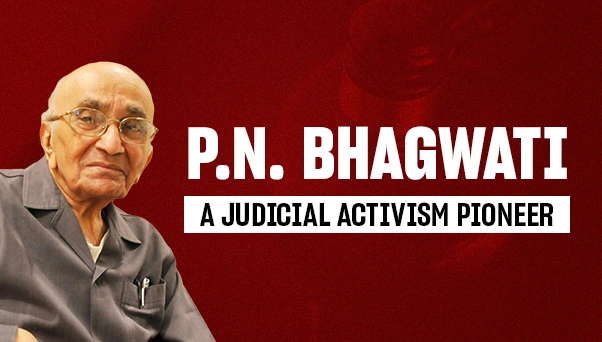Introduction
Prafulla Chandra Natwarlal Bhagwati, commonly known as P.N. Bhagwati, was a visionary in the Indian judiciary whose contributions have left an indelible mark on Indian law and the protection of human rights.
Serving as the 17th Chief Justice of India from July 1985 to December 1986, Bhagwati's tenure was notable for pioneering the concept of Public Interest Litigation (PIL) and advancing judicial activism in India.
Early Life and Education
In December 1921, P.N. Bhagwati was born in the state of Gujarat to a family with a long tradition within the legal profession. His father served as a judge on India's Supreme Court, instilling in P.N. an early passion for the law. This led P.N. to pursue his legal education initially at the prestigious Government Law College in Mumbai. He then continued his studies at Bombay University, where through diligent effort and an insightful intellect, he established himself as a notable scholar among his peers.
Legal Career
At the start of his legal journey, Bhagwati began practicing law at the Bombay High Court. He swiftly demonstrated remarkable legal expertise and a reputation of utmost integrity. His appointment to the Supreme Court of India in 1973 set the stage for a judicial career that would greatly impact many while also sparking some controversy.
Contributions to the Judiciary
Public Interest Litigation (PIL)
Chief Justice Bhagwati made his most important contribution by establishing and expanding Public Interest Litigation (PIL) in India. Moving past the customary locus standi necessity, Bhagwati permitted people and associations to record petitions addressing those unable to do as such independently, specifically the poor and marginalized. This made getting to justice accessible to all and transformed the judiciary into an instrument for social change.
Judicial Activism
Bhagwati strongly supported an active role for the courts, feeling they should address social inequalities and governmental inaction. During his time, a series of rulings broadened fundamental rights and guided government policies to improve people's wellbeing. His vision was for a judiciary that proactively sought justice and change through its decisions.
Landmark Judgments
Maneka Gandhi vs. Union of India
This pivotal legal battle established that the capability to journey overseas was an element of the "individual freedom" ensured underneath Posting 21 of the Indian Structure, consequently increasing the interpretation of elementary civil liberties. Justice Bhagwati dominated that traveling abroad was included in individual flexibility, a right safeguarded by the constitution.
Olga Tellis vs. Bombay Municipal Corporation
In this case, Justice Bhagwati's ruling shielded the means of support for thousands of people living on the streets of Mumbai. He affirmed that having the ability to support oneself financially is intrinsically tied to the right to life. By deciding that earning a living is interwoven with being alive, his decision protected them lives and livelihoods of those who called the pavements home.
Legacy and Criticism
Justice Bhagwati left a complicated legacy comprising groundbreaking accomplishments and debated rulings, such as his verdict during the Emergency era that has faced significant criticism. Regardless, downplaying his role in making the court system a more available and lively body would be remiss. His efforts to transform the judiciary aim to ensure rights for all people in a democratic society, though reasonable persons can disagree on specific cases.
Conclusion
Justice P.N Bhagwati reshaped India's legal system, establishing the courts as a place to remedy social problems. He championed human rights and believed judges should actively work to protect citizens. Through Public Interest Litigation, Bhagwati gave people access to justice, regardless of wealth or status. His rulings emphasized dignity and fairness for all. Years later, his push for equality and justice still guides India. As we look back on his work, Bhagwati's dream of a society where none are denied their basic rights remains a beacon of hope.
